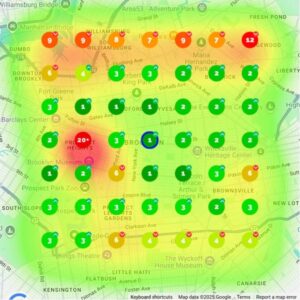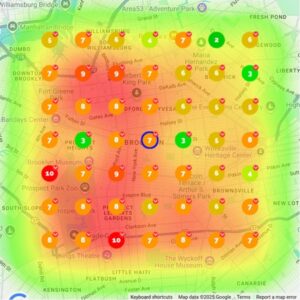..is one of the biggest challenges in local SEO right now, and if you’re dealing with service-area businesses, it’s even more complicated.Google has tightened up its radius enforcement, and unless you have a physical presence in a given area, your GBP won’t naturally surface there.
Can you break through? Yes. Yet let’s be real—this isn’t 2015 where you could just spam citations, stack a bunch of geo-relevant links, and expect to dominate. The algorithm is smarter, think AI, and proximity is a major factor!
If your client wants to expand, you need a combination of organic SEO, strategic entity-building, and continuous engagement signals to establish relevance in areas outside the immediate vicinity of the business location. Think Generative Search Optimization.
First, let’s talk about location pages. If you’re just slapping together city pages with templated content, pls stop.
That’s dead. You need content depth, unique service variations for each area, locally relevant references, and interlinking that creates a strong topical hub.
You also need to feed engagement signals—clicks, dwell time, search interaction, and most importantly, branded searches in those areas.
Now, about Google Business Profile expansion. If the client is asking whether the GBP itself will start appearing in further locations just because you build geo-relevant content, the answer is…
maybe, yet it’s an uphill battle.
Organic rankings and local pack rankings don’t function the same way. Organic rankings are more flexible, yet local packs are locked down by user intent signals. Thank you AI.
What’s working now?
Leveraging GBP posts strategically, consistently feeding location-based engagement, using supporting brand assets to reinforce the entity in each area, and making sure your internal linking structure builds a strong geo-topical connection between your pages and the target locations.
Some businesses try to brute-force the problem with multiple GMBs, yet Google has cracked down hard on this.
If you’re thinking about this route, make sure each listing is fully unique—address, phone number, landing page, and citations. Don’t just throw a cloned listing up and expect it to stick.
Another play?
Google Ads with the location extension. If local pack visibility is the goal and you’re struggling with organic reach, running search ads with the location extension can push you to the top of the maps.
It’s not a fix for organic ranking, yet it gives visibility in those tough-to-crack markets.
The old playbook doesn’t work anymore. If you want to win in 2025, you need to focus on entity-building, engagement signals, high-authority supporting assets, and if necessary, a well-structured paid strategy to fill in the gaps.
Here are the results applying the ranking steps from the GBP Crush audit and our GBP Optimization protocol for the top service keyword in the Pet Cremation niche. (3 weeks).



0 Comments